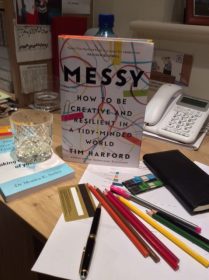Messy – How To Be Creative and Resilient in A Tidy-Minded World by Tim Harford
Do you prefer to tidy up your desk and sharpen the pencils before working or go to it no matter how messy the surroundings might be? We all have our preferences and in the open plan office it can present problems if you are surrounded by someone whose preference is diametrically opposed to yours.
But does our personal preference mean we are any more or less productive and creative than the other person? In his new book Messy Tim Harford (better known to some as The Under Cover Economist) looks at the pros and cons of working in a disorderly environment. He includes many case histories of how being disorganised and responding on the hoof can improve not only creativity but also customer’s experiences. Examples are drawn from the war, mathematics, music, business, sports and the whole office working environment.
For those unfamiliar with the now legendary Chiat Day futuristic open plan office he gives a very good account of why it’s initial success was lost and the office returned to a more conventional open plan set up.
Hartford suggests that whilst operating outside a tidy mind and environment can be very challenging for those with a tidy mind disposition, it can also help them open up new opportunities and find solutions to problems which might never have otherwise been found.
Harford’s underlying premise is that too many rules whether they apply to too much mess or conversely order do not encourage productivity and creativity. As an intriguing example he cites how even targets in the public sector should be random depending on situations rather than preconceived.
From an email perspective Harford will use folders for active projects then archives them into one large folder once complete thus not getting bogged down with complex folder structures.
It’s an interesting and easy read but in some ways is little more than a narrative to support his arguments. If you are looking for some real practice advice this is not the book for you. As a different take on why some people and projects (be they products or services) succeed and others fail, you can pick out some fascinating nuggets.
Tags: Email folders, Messy, Tim Harford